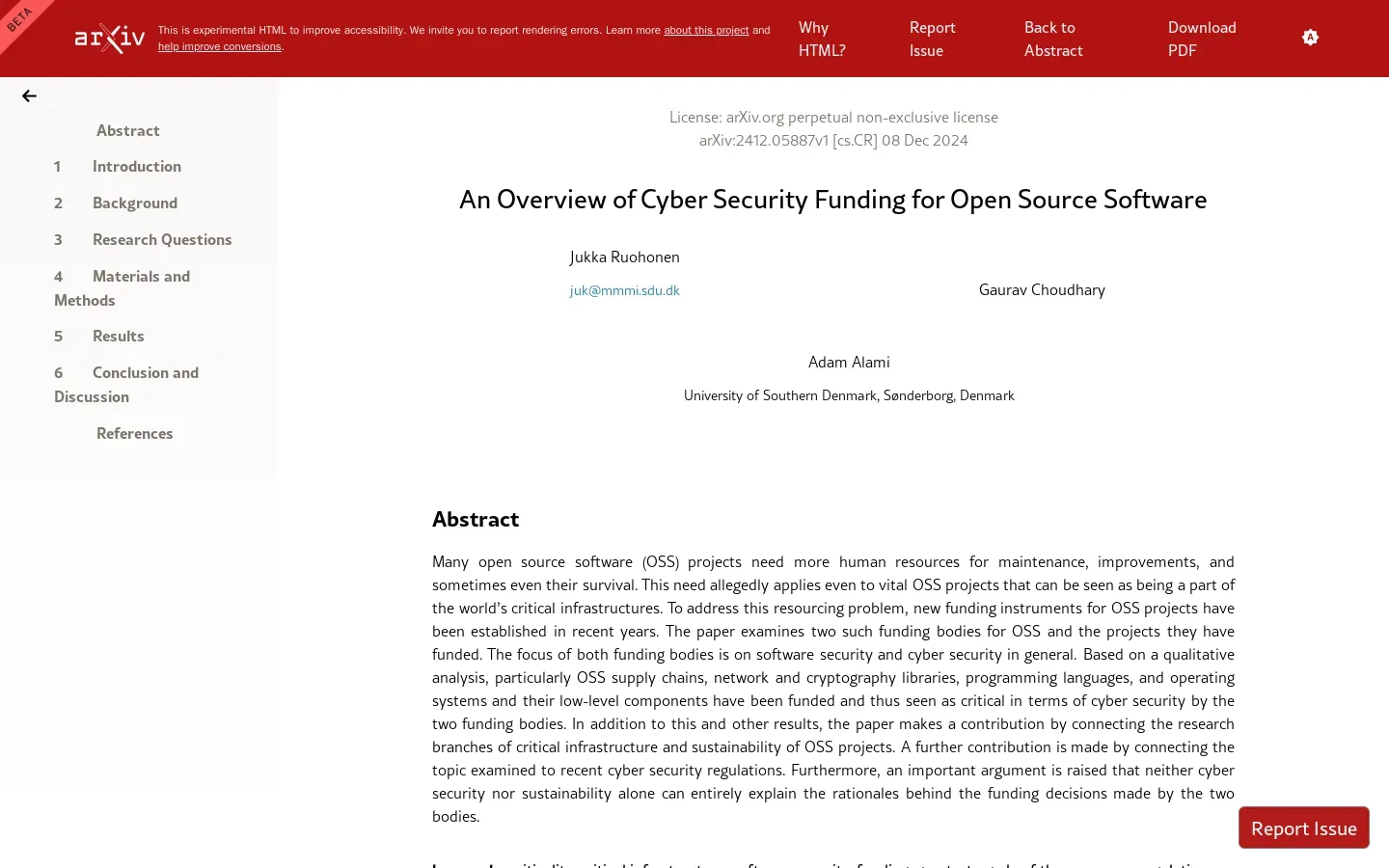
Cyber Security Funding for Open Source Software Explored
/ 5 min read
Quick take - A recent tutorial aims to enhance understanding of Open Source Software (OSS) projects and their significance for global cyber security by identifying funded projects, analyzing their contributions to key security areas, and connecting research domains to promote sustainability and resilience in digital infrastructure.
Fast Facts
-
Objective of the Tutorial: Aims to enhance understanding of Open Source Software (OSS) projects and their impact on global cyber security, focusing on identifying funded projects and their contributions to digital infrastructure security.
-
Critical OSS Projects: The tutorial emphasizes the importance of recognizing OSS projects that receive government funding, as they are foundational to maintaining robust cyber defenses.
-
Cyber Security Focus Areas: It analyzes key domains such as supply chain security, cryptography, and network security, highlighting their significance in enhancing cyber resilience.
-
Research and Sustainability Connection: The initiative seeks to bridge the gap between critical infrastructure research and the sustainability of OSS projects, advocating for a holistic approach to cyber security.
-
Implications for Future Strategies: Insights from the tutorial are crucial for developing effective cyber security policies and fostering collaboration among researchers, policymakers, and OSS communities to address emerging threats.
The Role of Open Source Software in Global Cyber Security
In today’s digital age, the security and stability of national infrastructures are increasingly reliant on robust cyber defenses. A recent tutorial has shed light on the pivotal role of Open Source Software (OSS) in this landscape, aiming to enhance understanding of OSS projects and their implications for global cyber security. This initiative seeks to identify critical OSS projects funded by governmental agencies, analyze their contributions to cyber security, and connect various research areas to bolster the sustainability of these essential projects.
Identifying Critical OSS Projects
The first step in this initiative is identifying which OSS projects have received funding from governmental agencies and understanding their significance in global digital infrastructure. These projects are often foundational to the internet’s security and reliability. Recognizing their role is crucial for maintaining robust cyber defenses. By mapping out funded OSS projects, stakeholders can better gauge which initiatives are deemed critical for securing digital ecosystems.
Analyzing Cyber Security Focus Areas
A key goal of the tutorial is to analyze the specific areas of cyber security that these funded OSS projects address. Highlighting domains such as supply chain security, cryptography, and network security underscores their importance in broader cyber resilience contexts. Supply chain security is particularly pertinent given the rising threats targeting software dependencies. By assessing how OSS projects contribute to these critical areas, the tutorial aims to provide insights into their effectiveness and potential gaps in current strategies.
Connecting Research Areas
The tutorial also aims to bridge research domains related to critical infrastructure and the sustainability of OSS projects. This connection emphasizes the need for ongoing research into how OSS can be maintained over time while serving as a linchpin for critical infrastructure. By exploring interdependencies between these fields, the tutorial advocates for a holistic approach to cyber security that recognizes OSS sustainability as key to ensuring long-term resilience in digital infrastructure.
Implications for Future Research and Policy
The insights from this tutorial hold significant implications for future research and policy-making. As the digital landscape evolves, understanding the critical role of OSS and its funding sources will be essential for developing effective cyber security strategies. Collaboration between researchers, policymakers, and OSS communities will be vital in ensuring these projects thrive and adapt to emerging threats. Addressing the interconnectedness of cyber security and OSS sustainability allows stakeholders to better prepare for tomorrow’s digital challenges.
Essential Steps for Navigating OSS Projects
-
Preparation: Gather all necessary materials and tools, ensuring you have the right software installed. A well-organized workspace enhances productivity.
-
Understanding the Basics: Familiarize yourself with foundational concepts before diving into complex aspects, providing a solid basis for advanced techniques.
-
Hands-On Practice: Engage in practical exercises that reinforce learning. Experimentation is key; mistakes are part of the process.
-
Feedback and Iteration: Seek feedback from peers or mentors after initial attempts. Reflect on insights and make necessary adjustments.
By following these steps, OSS project leaders can enhance their chances of securing funding and contribute to sustaining critical software infrastructures.
Strategies for Enhancing Project Sustainability
Establishing strong community engagement is vital. Fostering an inclusive environment encourages collaboration and feedback, attracting more contributors and building a loyal user base. Transparency in project management and financial reporting bolsters trust among stakeholders by clearly communicating goals, progress, and financial needs.
Leveraging partnerships with established organizations opens doors to additional resources and funding opportunities. Collaborating with businesses, universities, and non-profits provides both financial backing and valuable expertise, strengthening project foundations.
Key Tools and Resources
-
Sovereign Tech Agency (STA): Promotes national interests by supporting OSS projects that enhance security measures.
-
Open Source Security Foundation (OpenSSF): Improves open source software security by uniting developers, organizations, and researchers.
-
Software Bill of Materials (SBOM): Provides transparency by listing all components in a software product, aiding informed decision-making regarding security measures.
-
Public-Private Partnerships (PPPs): Collaborative efforts between government entities and private organizations drive investments in secure software solutions.
These resources not only elevate open source software security but also foster a collaborative environment encouraging ongoing improvement and innovation in the field.



